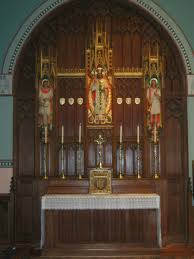Mount Calvary
A Roman Catholic Parish
The Personal Ordinariate of S. Peter
Eutaw Street and Madison Avenue
Baltimore, Maryland
Rev. Albert Scharbach, Pastor
Andrew Johnson, Organist and Music Director
The Feast of Christ the King
November 22, 2020
8:00 A.M. Said Mass
10:00 A.M. Sung Mass
This mass will be livestreamed
_________________
Organ Prelude
“Suite Médiévale: Prélude” Jean Langlais
Jean Langlais (1907-1991) was a blind composer and professor who was titular organist at the Basilica of Sainte Clotilde in Paris from 1945 until 1987. This prelude is the first movement from his “Medieval Suite,” which combines ancient Notre-Dame polyphony with Langlais’ 20th-century harmonic language. The composer quotes the Gregorian chant, “Asperges me,” entirely appropriate for a processional at Ste. Clotilde.
Organ Postlude
“Pasticcio” Jean Langlais
“Pasticcio” is the final piece from Langlais’ Organ Book, which was a wedding present to Jacqueline, the daughter of his first organ teacher, André Marchal. The regal opening gesture grows in intensity with each repetition, ending with nearly full organ.
_________________
Anthems
“O God, the King of glory” Henry Purcell
O God, the King of glory,
who hast exalted thine only Son Jesus Christ
with great triumph into heav’n:
We beseech thee, leave us not comfortless;
but send to us thine Holy Ghost to comfort us,
and exalt us unto the same place
where our Saviour Christ is gone before us. Amen.
Henry Purcell (1659-1695) was organist at Westminster Abbey from 1679 until his premature death. The composer alternates between homophonic and polyphonic sections of contrasting mood depending on the text.
__________
“O Sacred Feast” Healey Willan
O Sacred Feast, wherein Christ is received,
the memory of His Passion is renewed in us,
our souls are filled with grace,
and the pledge of everlasting glory is given unto us.
Alleluya.
Healey Willan (1880-1968) was a well-known Canadian organist, composer, and teacher of the 20th century. He wrote this simple eucharistic motet in 1924, a few years into his appointments at the Toronto University and the Church of St. Mary Magdalene.
________________
Hymns
All hail the Power of Jesus’ name (DIADEM) is by Edward Perronet (172?–1792), a member of a Swiss Huguenot family who emigrated to England. He was an associate of the Wesleys. The hymn is one of the most popular in all Christian churches. It begins with a reference to Philippians 2:10: “at the name of Jesus every knee should bow.” In our version the hymn addresses Israel, the chosen people, and then the Gentiles, every nation and tribe, and calls them to join in celebrating the Kingship of Jesus. The song of celebration is “everlasting”: as we sing this hymn we join in the song of the angels and saints, a song that will go on forever.
Jesus, the very thought of Thee (ST BERNARD). This hymn, attributed to St. Bernard, has as its theme the love of the soul for God. It begins by celebrating God’s presence as the supreme joy of mankind. It was translated by Edward Caswell.
Praise, my soul, the King of Heaven (LAUDA ANIMA), by the Anglican clergyman Henry Francis Lyte (1793—1847), is a paraphrase of Psalm 103. In the mid-nineteenth century, the pressure was on hymn writers to keep their versifications of psalms as close to the Scriptural text as possible. Henry F. Lyte would have none of this, and boldly published a book of psalm paraphrases entitled Spirit of the Psalms. Lyte decided he could maintain the spirit of the psalms while still using his own words, probably with the intention of making the reader see the psalms in a new light. Lyte’s text speaks to the love of God and our dependence on Him in a clear and imaginative way.
